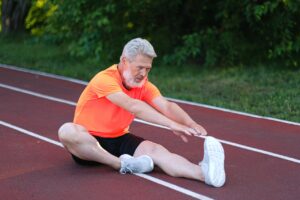Preventing Golfer’s Elbow: Exercises and Techniques to Preserve Joint Heal
Are you an avid golfer struggling with persistent elbow pain? If so, you may be experiencing a common condition known as a golfer’s elbow. This nagging injury can damper your golf game and overall enjoyment of the sport. Many people think that if they are using a golf simulator at home, this can be preventable, but it’s not. On the other hand, if you are planning to rent one, consider checking online for a golf simulator near me. In this blog post, we’ll explore some effective exercises and techniques to help prevent golfer loss and preserve joint health. Whether you’re a seasoned pro or just starting out, these tips will keep you swinging without the ache! So grab your clubs, and let’s dive in.
Warm-Up and Stretching
Before you start hitting the links, it’s crucial to warm up your muscles and stretch properly. This simple yet often overlooked step can significantly reduce the risk of developing a golfer’s elbow. Begin with a few minutes of light aerobic activity, such as brisk walking or jogging, to increase blood flow to your muscles. This will help prepare them for the upcoming physical exertion on the golf course. Next, focus on dynamic stretching exercises that target the muscles used in your golf swing. Incorporate movements that mimic the motions involved in swinging a club, such as arm circles and trunk rotations.
Strengthening Exercises
One of the key ways to prevent golfer’s elbow is by incorporating strengthening exercises into your regular workout routine. By specifically targeting and strengthening the muscles in your forearm and upper arm, you can help support and protect the tendons around your elbow joint. A simple yet effective exercise for golfers’ elbows is wrist curls. To perform this exercise:
- Sit or stand with a dumbbell in one hand, palm facing up.
- Slowly curl your wrist upwards towards your body while keeping your forearm still.
- Pause briefly at the top before slowly lowering back down to starting position.
Another great exercise is reverse wrist curls, which target different muscles in the forearm. With a dumbbell in hand, start with your palm facing down this time. Curl your wrist upwards towards your body as far as comfortable and then lower it back down slowly. In addition to these exercises, squeezing a stress ball or using a grip strengthener can also help strengthen the muscles involved in gripping and swinging motions. Always start with lighter weights and gradually increase as you build strength over time.
Modify Activities
When it comes to preventing golfer’s elbow, adjusting your activities can go a long way in preserving joint health. Here are a few techniques you can incorporate into your routine:
- Equipment: Evaluate the equipment you use for golfing or any other activity that involves repetitive arm movements. Ensure that your clubs have the appropriate grip size, and consider using an elbow brace or strap for added support.
- Technique: Pay attention to your technique while playing sports or engaging in any repetitive arm movements. Avoid overusing the same muscles by practicing proper form and technique.
- Rest and Recovery: Give yourself adequate rest breaks during any activity that puts strain on your elbows. This will help prevent overuse injuries and give your joints time to recover.
- Cross-training: Engage in cross-training exercises that target different muscle groups and reduce stress on the elbows. Incorporate activities like swimming, yoga, or Pilates into your fitness regimen.
Remember, modifying activities is not about giving up what you love; it’s about finding ways to protect yourself from injury while still enjoying the sport or exercise you’re passionate about!
Conclusion
By adopting these strategies into your routine – warming up properly before playing golf, performing regular stretching exercises targeting relevant muscle groups including forearms, wrists & shoulders- strengthening those same regions through controlled repetition using weights/resistance bands – modifying swing technique if needed due current condition (such as avoiding excessive grip pressures), you will effectively prevent future episodes of golfer’s elbow from occurring along with promoting healing if already experiencing discomfort related conditions like tendinitis/tear injuries.…





